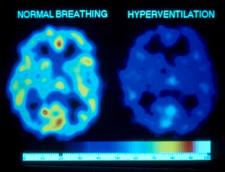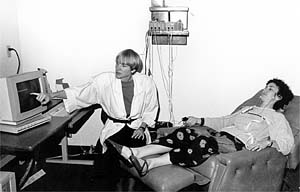
What is Behavioral Medicine?
Behavioral Medicine is the treatment of stress-related health problems with biofeedback and behavioral counseling. Direct biofeedback of muscle tension, skin temperature and response, heart rate, breathing and brain wave activity enables us to control stress. Behavioral Medicine is completely compatible with medical care received from a physician.
What is Behavioral Counseling?
Dis-ease in the body has physical, behavioral and psychological components that actively contribute to health problems. Behavioral patterns (or habits) stem from the past and become automatic and seem out of control. Some sources of undesirable patterns include dysfunctional family relationships, lifestyle habits, society stress and/or recurring negative thoughts. With Behavioral Counseling, we become aware of our “automatic tapes.” With this awareness, we can replace the old tapes with new ones. We can reprogram our minds and bodies with desirable patterns of behavior that promote health and happiness.
What is Overbreathing?
 Overbreathing means carbon dioxide (CO2) deficiency, a physiological condition known as hypocapnia. You may wonder, How can I have a CO2 deficiency? I thought CO2 was a waste product! Yes, CO2 is a waste produce in the sense that it is a byproduct of metabolism, but CO2 plays a crucial role in acid-base physiology. Although CO2 is excreted in the exhale, it is retained in the bood where it regulates pH levels vital to the distribution of oxycgen to tissues such as the brain. In fact, while at rest, only about 14 percent of the CO2 that travels in blood through the capillary bed of the lungs is actually excreted. In a healthy person, arterial CO2 is precisely maintained, even during exercise when CO2 production may increase by tenfold. Overbreathing means carbon dioxide (CO2) deficiency, a physiological condition known as hypocapnia. You may wonder, How can I have a CO2 deficiency? I thought CO2 was a waste product! Yes, CO2 is a waste produce in the sense that it is a byproduct of metabolism, but CO2 plays a crucial role in acid-base physiology. Although CO2 is excreted in the exhale, it is retained in the bood where it regulates pH levels vital to the distribution of oxycgen to tissues such as the brain. In fact, while at rest, only about 14 percent of the CO2 that travels in blood through the capillary bed of the lungs is actually excreted. In a healthy person, arterial CO2 is precisely maintained, even during exercise when CO2 production may increase by tenfold.
When TOO MUCH CO2 is being excreted by breathing too fast and/or too deeply, a CO2 deficit quickly develops resulting in alkalosis where the pH of the blood and other fluids is too high. The effects can be insidious and dramatic. The picture is an example of how dramatic the effect is on blood flow in the brain: the picture shows how one minute of moderate overbreathing reduced oxygen contraction by 40 percent! So which brain is yours? And, what effect could this loss of oxygen have on your ability to think, concentrate, and remember?
ARE YOU ONE OF THESE PERSONS? Surveys suggest that 10-25 percent of the US population suffers from chronic CO2 deficits (hypocapnia) as a result of overbreathing and that up to 60 percent of all ambulance calls in major US cities may be a direct result of the symptoms triggered by overbreathing. The effects of deregulated respiratory chemistry play a major role in so-called unexplained physical symptoms and performance deficits.
What is Mindful Respiratory Training (CapnoBreath Training)?
What will you learn?
Mindful Respiratory Training is about learning and teaching respiration through biofeedback which enables you to visually see the movement (mechanics) of your breath, the rise and fall of the chest and abdomen. At the same time the chemistry is being monitored and you are able to observe the CO2 levels. The objective of training while “at rest” is to restore proper breathing chemistry (CO2 levels), establish breathing rhythm, lower breathing rate, increase breathing depth, shift the locus of breathing from chest to diaphragm, encourage nasal breathing, relax musculature during exhalation, reduce collateral muscle activity, and establish stable presence of high amplitude heart wave activity (RSA, parasympathic nervous system tone).
Training for good breathing chemistry involves learning: 1) to evaluate breathing both at rest and in the context of multiple kinds of challenge; 2) about the physiology and psychology of respiration; 3) to identify the sensations of overbreathing, and reinstate the basic brain stem breathing reflex; 3) interpret physiological experience, e.g., deregulated vs. regulated breathing; 4) proper breathing mechanics: rhythm, volume, rate, resistance and locus of control; 5) to instate techniques for consciously disengaging or preventing overbreathing; 6) to generalize new patterns of breathing that normalize chemistry in diverse life circumstances, and 7) to establish “embracement physiology” and posturing by establishing new chemistry that is associated “physiologic mindfulness.”
Examples of performance training applications include: improving memory, enhancing thinking and problem solving, improving concentration (playing an instrument), attention training (attention deficit), reducing anxiety (public speaking, test taking), managing stress and anger, decreasing fatigue, reducing muscle tension, diminishing physical pain, facilitating relaxation and disciplines of inner directedness (meditation), natural child birth preparation, peak performance training (athletes and coaches), and evaluating and improving physical condition.
See article “Breath is Life” published in Moab Happenings.
For more information visit Mindful Physiology Institute
What is The HeartMath Solution Freeze-Frame?
Freeze-Frame is a biofeedback based learning system for the management and enhancement of emotions. It is a scientifically proven technique for clear decision making and improved health. You will discover how you can immediately lower stress hormones, raise anti-aging DHEA hormone levels, improve your heart rate for maximum longevity, maintain emotional clarity in the midst of chaos and achieve peak mental and intuitive performance.
For more information visit Institute of HeartMath.
How does Music Therapy fit in?
Music helps us discover, accept, express and integrate our emotions resulting in
improved health. See the Music/Sound Therapy section.
How many treatment sessions are necessary?
Relief from symptoms can occur as early as the first session. However, you should expect to treat a long standing pattern of negative behavior with 5 to15 sessions. The time will vary according to your daily practice of prescribed techniques at home. Sessions are once a week and are 50-90 minutes in length.
What is the cost?
Many insurance companies cover biofeedback. A sliding scale is available based on the number of sessions. The range is from $50-75 per session.
|






